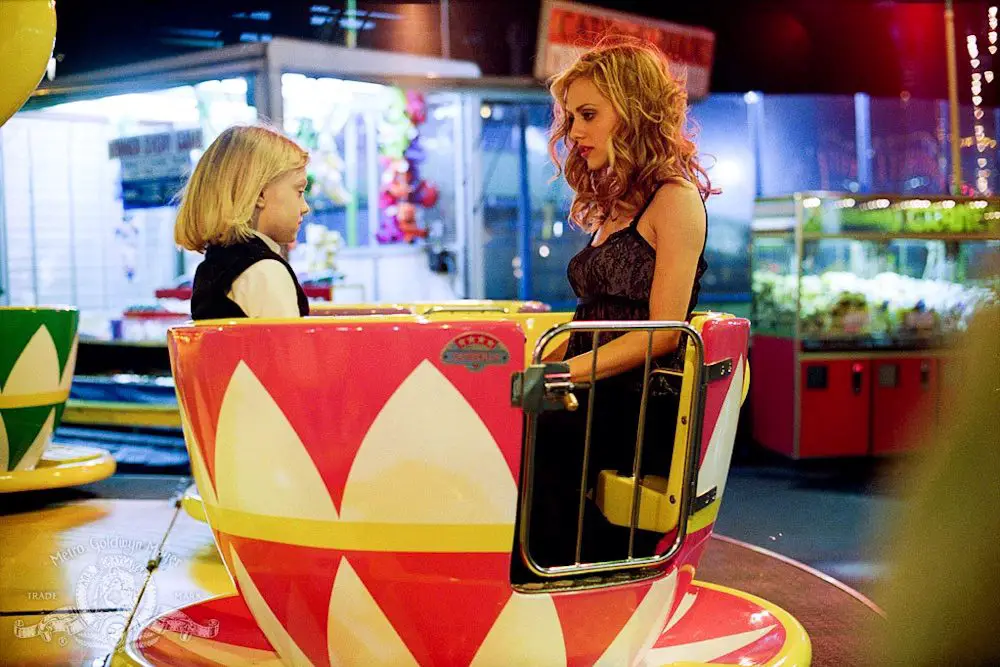After a meaningful loss, it feels like the world starts spinning in reverse. It is an overwhelming feeling having to face the rest of your life without their presence or guidance. Where do you even begin to pick up the pieces? It is much easier to just avoid the hard stuff. Life keeps moving, therefore it’s easier to keep moving and keep spinning. There is no changing the facts, they are gone. Avoidance is generally considered an adaptive response to loss. Grieving is not the same for everyone. No one person experiences grief in the same way. It is a feeling we feel for the rest of our lives that comes in waves, whether it is a month later, a year later, or years later. Such is the case in the 2003 comedy Uptown Girls.
On the surface, Uptown Girls is about party girl Molly Gunn (Brittany Murphy of Clueless) who ends up losing all her trust-fund money and having to finally grow up. When the film was first released, the critics were not too keen on the film. It is easy to write off Molly Gunn as an overgrown child who needs to act her age for once. It is supposed to be a comedy after all. I have always thought that the film was criminally underrated and more layered, contrary to popular belief. Every time I sit and watch Uptown Girls, I get something different from it or it comforts me in a way I need. However, it is when Molly becomes the nanny to an eight-year-old named Ray (Dakota Fanning of The Runaways), that it becomes more than a comedy from the early ’00s. Behind the sweet story about a friendship that blossoms between Molly and Ray, there is a story about how complex grief can manifest through avoidance.
Uptown Girls introduces us to Molly Gunn who is a charming free-spirit. She marches to the beat of her own drum. Molly lives off her trust fund and in her own fun-filled fantasy. She sleeps most days and is up all night partying with her two close friends. It’s a charmed life on the surface. On the night of her birthday, she spots a musician by the name of Neal Fox (Jesse Spencer of TV’s House) who she is instantly attracted to. Molly finds an opening and they wind up going to her apartment. It is when they go back to her apartment that we learn that her father, famous musician Tommy Gunn, and her mother were killed in a plane crash. Neal spots a piece of rock n’ roll history in her apartment: Tommy Gunn’s guitar. He is excited to see it in person, picks it up, and starts to sing a song called “Molly Smiles.” This triggers Molly and she asks him firmly but politely to stop. Talking about her parent’s death is an obvious button that shouldn’t be pushed.
Regardless of bringing up a touchy subject, Molly allows Neal to spend days in her apartment which he describes as “Through the Looking-Glass.” Cartoons are always playing in the background while weeks of laundry and trash are scattered throughout the apartment. It’s as if you gave a child free reign. The loss of her parents had left Molly emotionally stunted, refusing to face reality. It’s Neal’s reference to Alice in Wonderland that is poignant to Molly’s avoidance style. She has created a “Wonderland” for herself in order to provide herself with safety and security. The reality she created for herself mirrors the “real world” but still keeps her isolated from the burdens of the real world. Avoidance behavior is most commonly associated with anxiety and fear. She deliberately suppressed her thoughts and emotions connected to the loss when Neal brings up Tommy Gunn’s guitar. Unbeknownst to Neal, he made a crack in “Wonderland”.
Later in the film, Molly finds out that she has lost all her inheritance and has to get a job. After a failed attempt in retail, she takes on the role of Ray’s nanny. Ray is first introduced to us as a stoic and structured germaphobe. It is obvious right away that Ray is the complete opposite of immature Molly. If you are to take Uptown Girls at face value, introducing Ray this way feeds into the “opposite attracts” trope that we see time and time again in film. We learn that right away, Ray is more independent than most eight-year-olds because her mother is constantly working and never around. Ray’s father lies in a hospital bed in the library of their home and they are waiting for him to pass on.

Molly and Ray are two sides of the same coin. They are both avoidant of their pain. With an absent mother and dying father, Ray is her own parent. She is hyper-focused on her activities and wellness. Forced to grow up quickly, she sees the world for what it is, and because of that she “accepts” that she has a dying father, avoids facing it head-on, and goes on about her day. She can’t change this fact, so she stays in control of what she can. Molly’s avoidant style has her playing make-believe most of the time. Her emotional growth is stunted and ignores reality. It is the opposite approach to Ray but with the same result, to avoid dealing with their grief head-on.
Throughout the ups and downs of nannying Ray, the pair share quite a few moments where they butt heads. The fights often highlight how different Ray and Molly are. However, Molly genuinely sees a lot of herself in Ray. The two of them were both left to their own at very young ages and had to parent themselves the best way that they could. They are both two scared little girls.
It’s time to talk about the teacups in Uptown Girls. Their first attempt to ride teacups is a failure because they get to Coney Island a week before it is open for the season. When they get back to Ray’s home that night, Molly shares why Coney Island and the teacups are so important to her. For Molly, the teacups are a sense of control. The world has been spinning off its axis since Molly’s parents died and when she spins herself in the teacups she has control. She can spin as fast as she wants. Outside of Coney Island, the spinning teacups are also a popular Alice in Wonderland ride at Disneyland. Similarly to Alice, Molly’s journey is about self-discovery and healing similar to Alice’s. Molly opens up to Ray about how alone she feels and how she never wants to “get off the teacups”, it is eye-opening to Ray. Without admitting it, Ray feels seen. Ray is also on her healing and coming into her own journey. Most interpretations of Alice in Wonderland is that it is a story about self-realization not just in adolescence, but even in adulthood. For the first time, both Molly and Ray are seen by one another.
After the passing of her father, Ray goes missing and Molly is the one person who knows where she could be. She goes to Coney Island. Sitting in the teacups is eight-year-old Ray, just a girl who has had her world turned upside down. No matter how prepared you may feel and how inevitable it may be, losing a loved one will always turn things upside down. Molly joins Ray in the teacups and they spin it as fast as they can. Joining Ray in the teacups is a way of protecting Ray, saving her from continuing down the road she is on. Molly doesn’t want her to suffer in the way she did as a child alone. It is a cathartic moment for Molly and a lifeline for Ray.
Uptown Girls is filled with some laughs along the way and it is lighthearted in tone. There is much more to Uptown Girls outside of two rich girls who learn to act their age. It is a story about two people who have isolated themselves, got lost behind their walls, and learned to heal. Molly and Ray are no longer scared.



